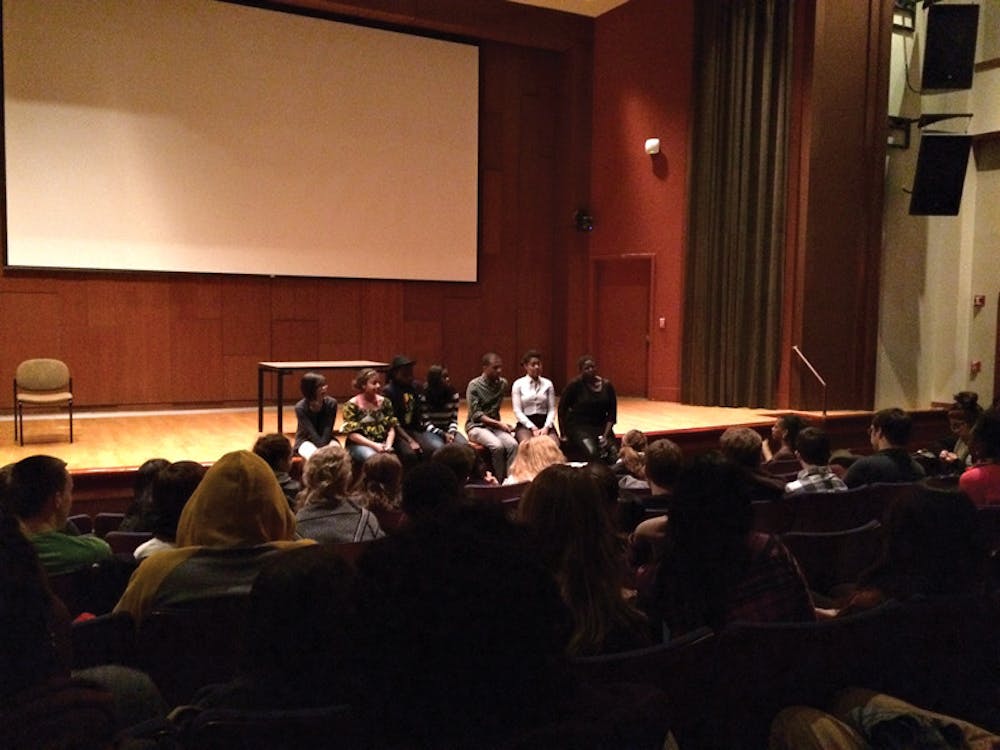“Black community is not monolithic,” says Reverend Eric P. Lee, dispelling ideas of a universal and singular African-American viewpoint in “The New Black,” a documentary by Yoruba Richen ’94.
The film exposes the divisions among blacks and the intersection of and conflict between black and LGBT individuals surrounding the issue of same-sex marriage. Together, they shared laughter and poignancy while witnessing moments of defeat, despair and ultimate triumph in the process of the legalization of same-sex marriage in Maryland. Students gathered in Salomon 101 on Monday for the film screening and question-and-answer session with Richen sponsored by the Office of Residential Life.
The film starts with President Obama’s inauguration in 2008 — the same day on which Proposition 8, the same-sex marriage ban in California, was passed and follows the passage of the law legalizing same-sex marriage in Maryland in February 2012.
The Office of Residential Life screened the documentary as part of its Residential Peer Leader training, said Annie Maselli, co-chair of the RPL training committee. The committee chose Richen’s film for its depiction of the intersectionality of multiple identities in a unique way, she said.
“We’ve been reflecting on previous trainings,” she said, adding that since last year the committee has brainstormed meaningful events for Martin Luther King, Jr. Day that are applicable to the work the RPLs do on campus.
The film follows some key figures during the campaign, such as Sharon Lettman-Hicks, executive director of the National Black Justice Coalition, several black ministers who have started challenging anti-gay sentiments in black churches and leading anti-gay black ministers, most notably Pastor Derek McCoy. Though the film focuses heavily on the role of the black church in LBGT rights, it demonstrates its complexity through the multitude of these voices.
The personal narratives of young activists who grapple with their conflicting black and LGBT identities emerge from the political heat portrayed in the film. While the film investigates why black and LGBT communities seem to be “pitted against each other,” it also gives voice to LGBT blacks who were “completely erased from that conversation,” Richen said after the screening.
Though she chose the name “The New Black” for its “provocative nature,” she said the term represents “the young activists who work for equality in our community.”
Several scenes of the activists at home with their families add poignancy to the film. In one scene, Karess, an activist and organizer for the Human Rights Campaign, visits her foster grandmother. After explaining that her grandmother does not know of her work in Baltimore, the film depicts them sitting on the front porch and talking about whether the grandmother is comfortable with Karess’ activity in the LGBT rights movement. At the end of their discussion, Karess comes out, asking whether her grandmother accepts her identity. The grandmother holds Karess’ hands and responds, “Grandma will love you” — a moment that elicited many snaps from the audience.
Maselli said she hoped the screening would help the RPLs “grow together as a community and support their residents.”
Maselli added that the RPLs agreed they should “continue to come back to the film throughout the semester as they plan next year’s training and incorporate more of these events.”
“Brown should definitely provide more spaces for this specific discussion of the tension between the marriage equality movement and the black religious community,” said Genesis Medina ’17, a minority peer counselor. “It should provide the space for queer (people of color) to share their stories and opinions, because their voices are the ones that are most ignored.”
Richen, whose film has gained international recognition, will go on a screening tour across the South in the next month, Medina said.
Richen added that though she has visited and screened this film at universities “much more conservative,” “religious” or “Christian” than Brown, she is content that it opened up conversations even in “those different spaces.”
“I didn’t know that this was going to end up an activist film,” Richen said. “But I am happy it is able to foster conversations with people who may have different opinions… I’m very pleased about that.”





